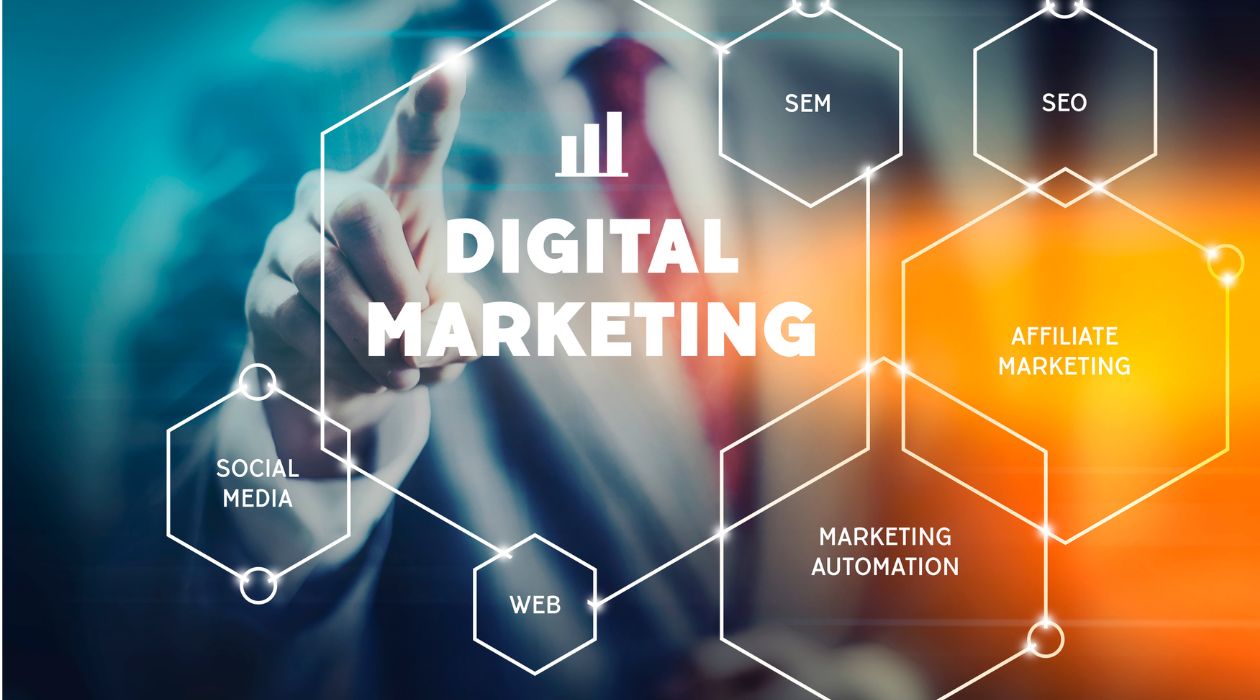Professional Service Marketing Agency
Digital marketing for professional services
Digital marketing strategies for professional services involve leveraging various online platforms and tools to reach and engage with a target audience effectively. Search engine optimization (SEO), social media marketing, content marketing, email marketing, paid advertising, and other tactics may be used. The goal is to increase brand visibility, generate quality leads, and ultimately drive conversions.
Benefits of using digital marketing strategies for professional services
Enhanced Brand Visibility:
Targeted Audience Reach:
Cost-Effective Marketing:
Increased Lead Generation:
Improved Client Engagement and Relationship Building:
Measurable Results and Data-Driven Decision-Making:
Digital marketing provides access to comprehensive analytics and data tracking tools, enabling professionals to measure the effectiveness of their marketing efforts. This data includes information about website traffic, conversion rates, customer behavior, and more. By analyzing this data, professionals can make data-driven decisions, optimize their marketing strategies, and achieve better results over time.
How do you promote professional services through digital marketing?

Search Engine Optimization (SEO)
SEO is an essential digital marketing strategy for promoting professional services. With effective SEO techniques, you can enhance your website’s ranking for relevant keywords, attracting organic traffic and increasing your online presence. By focusing on targeted keywords and creating high-quality content, you can position your professional services as the go-to solution for potential clients searching online.
Pay-Per-Click (PPC) Advertising
Content Marketing
Social Media Marketing:
Email Marketing:
Online Reputation Management:
Developing a Digital Marketing Strategy:
Importance of competitor analysis in professional services digital marketing

Identify Market Trends and Opportunities:
Benchmark Your Performance:
Stay Updated on Industry Best Practices:
Differentiate Your Brand:
Enhance Targeting and Messaging:
Identify Untapped Marketing Channels:
Importance of website optimization in professional services digital marketing
Website optimization plays a crucial role in the success of digital marketing for professional services. It involves improving various elements of a website to enhance user experience, drive traffic, and generate leads. Here are some key aspects of website optimization and their importance in professional services digital marketing:
Check for Website User-Friendliness and Mobile-Responsiveness:
Optimizing Website Structure and Navigation:
Incorporating Relevant Keywords for SEO:
Creating Landing Pages for Lead Generation:
Implementing Effective Calls-to-Action (CTAs):
Content marketing for professional services: Importance of informative content and valuable blogs
Establishing Authority and Expertise:
Educating and Addressing Client Pain Points:
SEO Benefits and Increased Visibility:
Choosing the right digital marketing channels

Identify the Main Goal for Professional Services:
Begin by clearly defining your main goal or objectives for your professional services. Is it to generate leads, increase brand awareness, drive website traffic, or enhance client engagement? Understanding your primary goal will guide your channel selection process and ensure alignment between your marketing efforts and desired outcomes.
Select the Targeted Audience:
Select the Correct Platform to Target the Audience and Achieve the Goal:
Selecting the right social media platforms for professional services
Choosing the right social media platforms is crucial for professional services to effectively reach and engage with their target audience. Here are key factors to consider when selecting the appropriate social media platforms:
Building a Strong Online Presence and Brand Image:
Engaging with the Target Audience through Relevant Content:
Running Targeted Ad Campaigns on Social Media:
Monitoring and Managing Online Reputation:
Paid Advertising for Professional Services:
When selecting social media platforms, take into account the effectiveness of paid advertising options for professional services. Some platforms provide better targeting capabilities and ad formats suited for professional service providers. Evaluate the advertising features, ad formats, and audience targeting options offered by each platform to determine which aligns best with your goals and budget.
It’s important to note that your social media presence doesn’t need to be on every platform. Focus on the platforms that align with your target audience, business goals, and resources. Quality over quantity is key when it comes to social media presence.
Regularly monitor the performance of your chosen social media platforms, analyze engagement metrics, and adjust your strategies accordingly. Social media is a dynamic space, so staying informed about emerging platforms and trends can also help you stay ahead in your digital marketing efforts.
Setting up PPC campaigns (Google Ads) for professional services:
PPC (Pay-Per-Click) advertising, specifically Google Ads, can be a powerful tool for professional services to drive targeted traffic, generate leads, and increase brand visibility. Here are key steps to effectively set up PPC campaigns for professional services:
Conducting Keyword Research and Targeting:
Creating Compelling Ad Copy:
Optimizing Ad Campaigns for Better Performance:
To optimize your ad campaigns, consider the following strategies:
- Ad Group Organization: Group keywords into relevant ad groups to ensure that ads are highly targeted and aligned with specific services or products.
- Ad Extensions: Utilize ad extensions such as site link extensions, call extensions, or location extensions to provide additional information and enhance the visibility and appeal of your ads.
- Landing Page Optimization: Ensure that your landing pages align with your ad copy and provide a seamless user experience. Optimize landing pages for relevant keywords, load speed, and clear CTAs to improve conversion rates.
- Ad Scheduling and Budget Allocation: Analyze data to identify peak times or days when your ads perform best. Adjust your ad scheduling and budget allocation accordingly to maximize ad exposure during these periods.
Tracking and Measuring Ad Campaign Results:
Email marketing for professional services:
Designing Visually Appealing and Engaging Email Templates:
Segmenting the Audience for Personalized Messaging:
Implementing Automation and Drip Campaigns:
Analyzing Email Metrics for Performance Improvement:
Measuring and Analyzing Digital Marketing Performance:
In addition to email marketing, it’s crucial to measure and analyze the overall performance of your digital marketing efforts for professional services. Utilize tools like Google Analytics, Google Ads, and social media analytics to track and measure key performance indicators (KPIs) such as website traffic, conversion rates, engagement metrics, and ROI. This allows you to assess the effectiveness of your digital marketing strategies and make data-driven decisions for improvement.
By consistently building and nurturing your email list, and implementing effective email marketing strategies, professional services can strengthen their relationships with subscribers, drive engagement, and increase conversions. Regularly monitor and analyze email metrics and overall digital marketing performance to refine your strategies and achieve better results for your professional services.
Monitoring performance of marketing campaigns:
Monitoring the performance of your marketing campaigns for professional services is crucial to assess their effectiveness, identifying areas for improvement, and make data-driven decisions to optimize your strategies. Here are key steps for monitoring campaign performance using tools like Google Analytics (GA), Google Search Console (GSC), and Google Tag Manager (GTM):
Tracking Key Performance Indicators (KPIs):
Analyzing Traffic Sources and User Behavior:
Monitoring Conversion Rates and Lead Generation:
Making Data-Driven Decisions for Optimization:
Ongoing Monitoring and Reporting:
Continuously monitor and track the performance of your marketing campaigns over time. Set up regular reporting and dashboards to keep stakeholders informed about the progress and results. Use GA, GSC, and GTM to generate customized reports that provide insights into the key metrics and KPIs relevant to your professional services. Regularly communicate the performance and impact of your campaigns to stakeholders and make adjustments as needed.
By consistently monitoring and analyzing the performance of your marketing campaigns using GA, GSC, and GTM, you can gain valuable insights to optimize your strategies, improve conversion rates, and generate more leads for your professional services.
FAQs:
How can digital marketing help professional services?
Digital marketing helps professional services enhance brand visibility, reach a targeted audience, generate leads, and engage with clients through various online channels.How do you promote professional services through digital marketing?
Professional services can be promoted through strategies such as content marketing, social media marketing, email marketing, SEO, paid advertising, and online reputation management.Which is the best channel to generate leads for professional services?
The best lead generation channel for professional services depends on the target audience and business goals. However, content marketing, SEO, and email marketing often prove effective in generating quality leads.How long does it take to see results from digital marketing?
The time to see results from digital marketing varies based on factors such as industry, competition, and marketing strategies employed. Generally, it can take a few months to see significant results, but continuous effort is required for long-term success.What should be the ideal digital marketing budget for my professional service?
The ideal digital marketing budget for professional services depends on various factors, including business size, goals, competition, and target audience. It is recommended to allocate a budget that allows for a comprehensive digital marketing strategy and regular optimization.How can I measure the success of my digital marketing campaigns?
Success measurement in digital marketing can be done through various metrics, including website traffic, conversion rates, lead generation, social media engagement, and ROI analysis. Tools like Google Analytics and marketing automation platforms provide insights for performance evaluation.